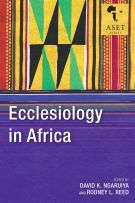| ISBN: | 9781786410450 |
|---|---|
| Imprint: | Langham Academic |
| Format: | Paperback |
| Dimensions (mm): | 229 x 152 x 17 |
| Publication Date: | 30/06/2025 |
| Pages: | 326 |
| Series: | Studies in Theology |
| Language: | English |

Mafanikio Theology
Learning Prosperity with Tanzanian Women
While the prosperity gospel is thought to be widespread in Africa, there has been little scholarship exploring the variations in prosperity theologies across the continent or the impact of such theologies at a grassroots level.
In this study, Dr. Tamie Davis uses ethnographic methods, including participant observation, semi-structured interviews, and focus groups, to synthesize the prosperity (mafanikio) theology embraced by female graduates of the Tanzania Fellowship of Evangelical Students (TAFES). Taking an appreciative approach, Davis examines mafanikio theology’s hermeneutical framework and historical and cultural influences, highlighting its commonalities and discontinuities with other prosperity theologies, and bringing it into conversation with global models of holism. In doing so, she demonstrates that this indigenous Tanzanian theology offers a holistic alternative to profligate versions of the prosperity gospel by emphasizing both human flourishing and devotion to Christ. Mafanikio theology thus integrates prosperity into a holistic life of discipleship, emphasizing biblical grounding, and encouraging hard work and perseverance.Endorsements
Tamie Davis offers a significant contribution to the discourse on the prosperity gospel by illuminating a crucial dimension of African Christian experience: the interconnectedness of life and the holistic nature of God’s blessings. Drawing from a local Tanzanian mafanikio theology, Davis presents a contextual understanding of a God who is deeply involved in the everyday lives of people, desiring their well-being and success.
Harvey Kwiyani, PhD
Executive Director, Missio Africanus
With ethnographic rigour and theological depth, Davis has enabled the voices and practices of Tanzanian women to be heard in their mafanikio theology, which critiques the profligate prosperity gospel and offers a constructive alternative. Don’t read this book to learn about Tanzanian women; read it to learn from them.
Rev. David Williams, PhD
Development and Training Director,
Church Mission Society, Australia
Tamie Davis narrates a grassroots story of women whose social positions nevertheless identify their middleclass status, yet whose contribution to spiritual insight is overlooked. This is an important trajectory in the emerging perspectives on the demographic transition of the continent in the twenty-first century, the place of Christian faith in shaping that transformation and therefore the agency of African Christians in determining the future of the continent.
Wanjiru Gitau, PhD
Assistant Professor of World Christianity and Practical Theology,
Palm Beach Atlantic University, Florida, USA
Through ethnographic study and interviews with Tanzanian women, Tamie’s attentive listening discloses a new understanding of and approach to what we have commonly called prosperity theology. I warmly recommend Tamie’s work not only for the new understanding it offers but also for how this is rooted in the lived experience of Tanzanian women seeking to be faithful to God.
Cathy Ross, PhD
Lead, Pioneer Mission Leadership Training Centre,
Church Mission Society
Canon Theologian, Leicester Cathedral, UK
Table of Contents
- Abbreviations
- Chapter 1 Introduction
- 1.1 “Just have more faith in God and he will heal you.”
- 1.2 Statement of the Problem and Objectives
- 1.3 Significance of the Study
- 1.4 Research Design
- 1.5 Research Question
- 1.6 Definition of Terms
- 1.7 Assumptions and Limitations of the Study
- 1.8 Conclusion and Outlook





